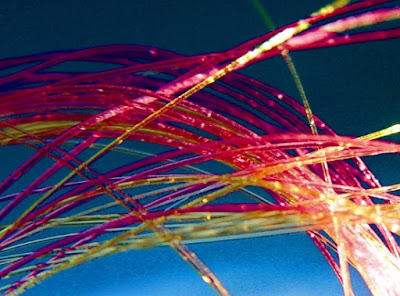Pondering Polymers
Someone may be thinking, "Oh, no, this is some hardcore sciencey stuff". No need to run off. While polymers are extremely important and complicated, we are not going to be saddling up for a difficult ride. This will be rather basic, and some of the information may be a bit surprising to you like it was to me.
Polymers are building blocks. The word comes from poly for many, and mers for...something else.
"Parts, Cowboy Bob."
Yeah, that's it. Many parts. Polymers are built from molecules called monomers, and those monomers are made into polymer chains of sometimes thousands of repeating units. You've heard of proteins? They are polymers made from amino acids. We're loaded with polymers. There are many polymers in nature, such as cotton fibers.
Scientists can be very helpful when they use their God-given minds, training, experiences, and skills. Synthetic polymers made from petroleum became popular and important, including applications in medical science, such as synthetic heart valves. But there are disadvantages to petroleum-based synthetic polymers, mainly to the environment. Scientists are looking more to what our Creator has given us, and developing more environmentally friendly plastics. You'd be surprised what uses can be had from corn. In fact, if you've a mind to, there's an experiment at the link below where you can make a polymer from milk!
 |
| Bi-component fibres are produced from two different polymers which, when extruded together, can produce new fibres with new features. Credit: CSIRO / Bea Lipson (CC BY 3.0) (Usage does not imply endorsement of site contents) |
"Parts, Cowboy Bob."
Yeah, that's it. Many parts. Polymers are built from molecules called monomers, and those monomers are made into polymer chains of sometimes thousands of repeating units. You've heard of proteins? They are polymers made from amino acids. We're loaded with polymers. There are many polymers in nature, such as cotton fibers.
Scientists can be very helpful when they use their God-given minds, training, experiences, and skills. Synthetic polymers made from petroleum became popular and important, including applications in medical science, such as synthetic heart valves. But there are disadvantages to petroleum-based synthetic polymers, mainly to the environment. Scientists are looking more to what our Creator has given us, and developing more environmentally friendly plastics. You'd be surprised what uses can be had from corn. In fact, if you've a mind to, there's an experiment at the link below where you can make a polymer from milk!
Corn is an amazingly versatile creation. You can use corn to drive to a picnic, where you put kernels of corn on corn and scoop the kernels up with more corn to eat them. Huh? Well, you can drive to a picnic spot, powered by a mix of gasoline and ethanol—which is made from corn. Once there, you can put corn on a plate made from corn plastic and eat it with a plastic fork that is also made from corn. How can one plant do so many things? The answer is in God’s amazing design of polymers.To finish reading, click on "Growing Plastics on the Farm".
Polymers are the building blocks of life. The same molecules can be shuffled around from plants to animals and back to inanimate objects, forming an infinite variety of structures.